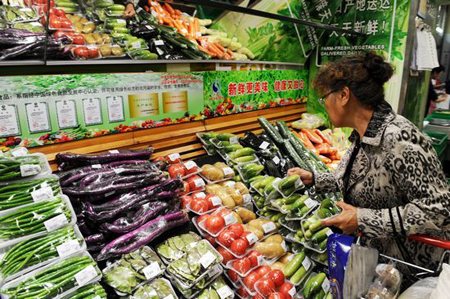(Ecns.cn) – Food scandals involving mislabeling may sound like old news in China, where one can see counterfeit products everywhere. However, when it has to do with food safety, fake organic labeling may be another thing altogether.
Hanging about in a supermarket, you will probably see organic honey that costs 358 yuan ($55.3) a kilogram, organic pork at 160 yuan ($24.7) a kilogram, and organic grains at 268 yuan ($41.4) a box (268 grams).
But it turns out these expensive organic products are not all authentic and the labels may not mean much. According to the Beijing News, investigations have shown that many food producers buy organic certificates in order to add value to their products, even if the food has been cultivated with synthetic pesticides and fertilizers.
In provinces such as Shandong and Guangxi, it is a very common practice to buy off a local organic certification organization with only 20,000 to 30,000 yuan ($3,092 to $4,638) a year. Thus, the labels on these products will be the same as those on authentic ones.
A much worse situation is that some food enterprises even stick fake organic certificates on their products, because it will double or sometimes achieve five times the normal profits, said Liu Gang, a broker who has been doing organic business in Beijing, Shandong, and Guangxi for years.
China's Certification and Accreditation Administration (CNCA) said the current regulatory regime for organic foods is not up to speed with the rapid development of the industry. With CNCA as the only regulator across the nation, there are regulatory loopholes. Different government departments must cooperate with one another to strengthen the supervision work.
Last month, Walmart stores in southwest China's Chongqing were forced to close following allegations that they had been labeling non-organic pork as organic and selling it at a higher price.


















